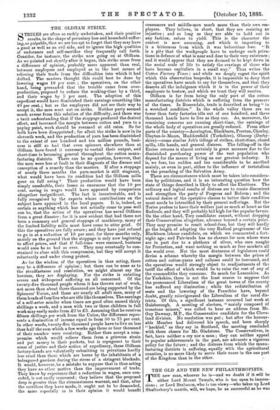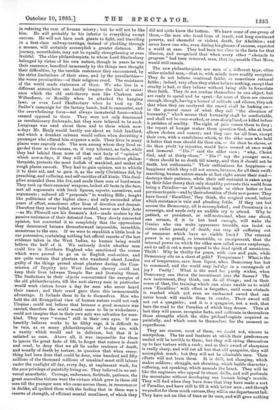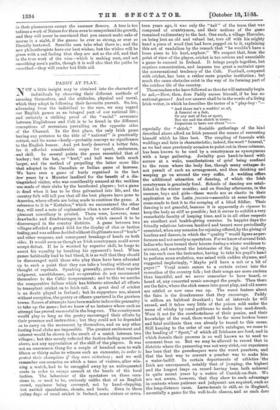THE OLD AND THE NEW PHILANTHROPISTS.
rE new man, whoever he is—and we doubt if it will be either Lord Mount Temple, who is too open to impres- sions; or Lord Brabazon, who is too viewy—who takes up Lord Shaftesbury's mantle, will, we hope, be as successful as he was in reducing the sum of human misery ; but he will not be like him. He will probably be his inferior in everything except success. He will not have such giants to fight, and travelling in a first-class railway-carriage, instead of plodding through a morass, will certainly accomplish a greater distance. His journey, nevertheless, may not be equally strengthening or even fruitful. The elder philanthropists, to whom Lord Shaftesbury belonged by virtue of his own nature, though in years he was their successor, benefited immensely by the things men thought their difficulties, by the terrible resistance they encountered, by the strict limitations of their aims, and by the peculiarities— the worse peculiarities—of their religious creed. The resistance of the world made statesmen of them. We who live in a different atmosphere can hardly imagine the kind of resist- ance which the old anti-slavery men like Clarkson and Wilberforce, or Romilly when he attacked the hanging laws, or even Lord Shaftesbury when he took up Mr. Sadler's campaign for the factory hands, had to encounter, and the overwhelming force—not always immaterial force—which seemed opposed to them. They were not only denounced as revolutionary firebrands, but they were believed to be such. Language was used about them and to them which now- a-days Mr. Healy would hardly use about an Irish landlord, and which a drunken cabman would soften when describing a passenger who offered him sixpence a mile. Their lives in many places were scarcely safe. The men among whom they lived re- garded them as fire-raisers, or, if very tolerant, as fools, while they had behind them none of that vast body of " opinion " which now-a-days, if they will only call themselves philan- thropists, protects the most foolish of mankind, and makes all rough places smooth. They had to gain opinion, not to whistle it to their aid, and to gain it, as the early Christians did, by preaching, and suffering, and self-sacrifice of all kinds. This disci- pline annealed them like fire, and made them men of hard sense. They took up their enemies' weapons, looked all facts in the face, met all arguments with fresh figures, reports, narratives, and arguments ; reduced all " proposals " to working Bills ; fought like politicians of the higher class ; and only succeeded after years of effort, sometimes after lives of devotion and despair. Therefore they never failed, never receded, never saw their Acts —as Mr. Plimsoll saw his Seamen's Act—made useless by the passive resistance of their defeated foes. They slowly converted opinion, but converted it so completely that the oppressions they denounced became thenceforward impossible, incredible, monstrous to the ears. If we were to republish a little book in our possession, containing nothing but official reports of the last evidence taken in the West Indies, no human being would believe the half of it. We seriously doubt whether men could live in Northern England who sanctioned the scenes which were proved to go on in English coal-mines, and are quite certain that planters who wandered about London guilty of the things proved about planters during the Com- mission of Inquiry into West Indian slavery could not keep their lives between Temple Bar and Downing Street. The limitations to their objects concentrated the energies of the old philanthropists, till the anti-slavery men in particular would work sixteen hours a day for men who never heard their names ; and their creed gave them this immeasurable advantage. It forbade them to lie to themselves. Men who held the old Evangelical view of human nature could not seek Utopias ; could not believe that because a good measure was
• carried, therefore the world would cease to lie in wickedness ; could not imagine that in their own acts was salvation for man- kind. They were " worms " still in their own eyes. If one heartily believes works to be filthy rags, it is difficult to be vain, as so many philanthropists of to-day are, with a vanity which would end in delirium, but that it is satiated so soon. Above all, it was impossible for them to ignore the great facts of life, to forget that nature is dumb and cruel, to deny that we all lie under sentence of death, and usually of death by torture, to question that when every- thing had been done that could be done, nine hundred and fifty millions of the thousand millions of mankind must still labour under the sunlight all day, every day, at unpleasant work, for the poor privilege of painfully living on. They believed in no uni- versal anwsthetic. Courage, endurance, fortitude, patience, the great masculine virtues were the virtues which grew in these old men till the younger men who came across them, in reverence or in dislike, all quitted them with the feeling that in them was a reserve of strength, of efficient mental manliness, of which they
did not quite know the bottom. We knew some of one group of them,—the men who faced lives of insult, and long-continued poverty, and shameful or violent death, for Abolition ; and never knew one who, even during his gleams of success, expected a world at ease. They had been too close to the facts for that illusion, and recognised that when every other "obstacle to progress" had been removed, man, that impassable Chat Moss, would still remain.
The new philanthropists are men of a different type, often wider-minded men,—that is, with minds more readily receptive. They do not believe irrational faiths, or sometimes rational faiths ; indeed, very often they either believe nothing, except that cruelty is bad, or they believe without being able to formulate their faith. They do not confine themselves to one object, but are ready to spend and be spent—for most of them are sincere enough, though, having a horror of solitude and silence, they ask that when they are martyred the crowd shall be looking on— in the general cause of what they call "the elevation of humanity," which means that humanity shall be comfortable, and shall not be over-worked, or over-disciplined, or killed before it perishes of senility. The sight of pain rouses them to fury ; the report of hunger makes them question God, who at least allows cholera and cancer; and they care for all lives, except their own, with a carefulness which, to the elder men who held it better that men should die than sin, or die than be slaves, or die than profit by injustice, would have seemed at once weak and immoral. "Die !" said the older men ; "why, Christ died, and at thirty-three." "Die !" say the younger men ; "there should be no death till ninety, and then it should not be death, but euthanasia." Their enthusiasm for happiness—a happiness which they will not secure, because, for all their swift- marching, human nature stands at last right across their road— destroys their patience, while their seltrestraint is eaten away by their false theory that only stupidity prevents this world from being a Paradise—as if intellect made us either better or less pervious to pain—and by their adoration of their new power. They have found Excalibur,' they think, the magical sword, before which resistance is vain and pleading futile. If they can but arouse the Democracy, all is accomplished ; and Democracy is a sovereign, and needs only an audible cry to attend. Why be patient, or persistent, or self-restrained, when one shout, one scream, if it be but loud enough, will wake the Genius who can make oppressors tremble, can insist on virtue under penalty of death, can stop all suffering out of resources which have no visible limit ? The external power is so grand, so irresistible, so omnipresent, that the internal power on which the older men relied seems surplusage, and to call it out a mere appeal to the dead spirit of asceticism. Thrift ! Why be thrifty for years, with care and pain, while Democracy sits on a chest of gold ? Temperance ! What is the use of temperance, save from liquor, when Democracy has but to command, and the world may indulge in a carmagnole of joy ? Purity ! What is the need for purity within, when Democracy can throw the incontinent into the flames ? The new instrument, they think, can do all things;, and in their sense of that, the training which can alone enable us to wield even Excalibur ' with effect is forgotten, until some obstacle is reached which not even an enchanted sword that can never break will enable them to sunder. Their sword will not cut a quagmire ; and it is a quagmire, not a rock, that bars the road to the Paradise of which they dream. Then at last they will pause, recognise facts, and cultivate in themselves those strengths which the elder philanthropists acquired so painfully, and which seem to themselves for the moment so superfluous.
They are sincere, most of them, we doubt • hot, sincere to martyrdom. The tar and feathers at which their predecessors smiled will be terrible to them ; but they will string themselves up to face torture with a rush ; and as their sword of sharpness is really sharp, and will cut all but that old quagmire, they will accomplish much; but they will not be admirable men. Their efforts will not train them. It is drill, not charging, which makes soldiers ; struggle, not shouting, which builds character; suffering, not speaking, which anneals the heart. They will be like the engineers who appeal to steam drills, and will perforate the mountains without developing one human being's muscle. They will find when they have done that they have made a sort of Paradise, and have still to fill it with better men ; and though we predict for them much succese, they will in one department fail. They have not an idea of time or its uses, and will grow nothing
in their pleasaunces except the summer flowers. A tree is too tedious a work of Nature for them even to comprehend its growth, and they will never be convinced that you cannot make oaks of acorns in a night, if the guano be ever so strong, or ever so liberally bestowed. Sensible men take what there is ; and the new philanthropists have our best wishes, but the wishes will be given with a sad feeling that they are not as the old, and that in the true work of the wise—which is making men, and not smoothing men's paths, though it is well also that the paths be smoothed—they will render but little aid.




































 Previous page
Previous page